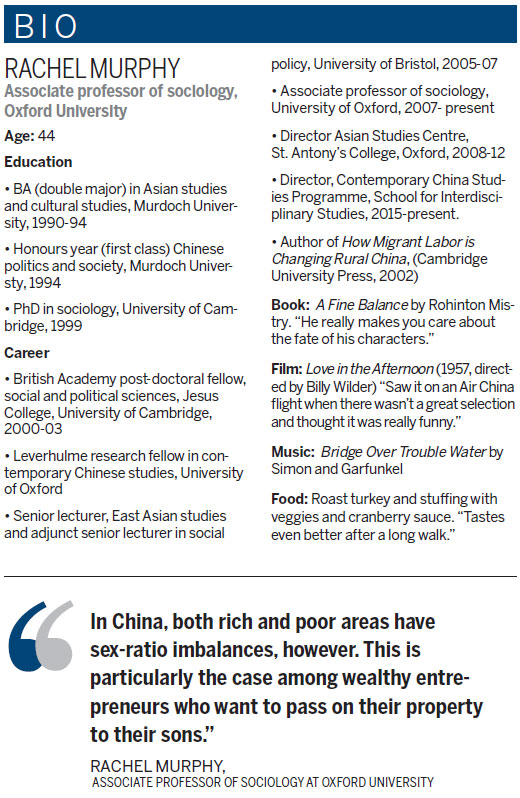Rural families still hope for male heirs
Updated: 2015-09-05 07:47
By Andrew Moody(China Daily Europe)
|
|||||||||||
"They said, 'You have asked every representative rural family why their son had gone away and they have told you it was to earn money. Why do you think they have gone out for?'"
Murphy is writing her second book on the phenomenon of so-called left-behind children in rural areas who are often raised by their grandparents while their parents go to the cities to work.
"Sometimes people overlook the pressure placed on grandparents. I had a daughter at the age of 40, I have a husband who helps with the housework, a washing machine, running hot water, a pretty good income and the ability to pay for a child minder who is really good," she says. "Imagine if I was 60 or 70 and as well as looking after three children also had to look after a farm, collect fern for fuel, husk the grain and wash the soil from the vegetables to cook. There are no ready meals from the fridge to microwave. It is just a substantial burden."
She says new boarding schools that in many rural areas have replaced village schools, which no longer had enough

numbers to support them, have taken some of the pressure away.
"Policymakers have identified these schools as the solution to the care deficit of left-behind children and in some cases they have become their second home. Parents like them because they are worried about grandparents spoiling the children, and they think they will be safer and receive a better education in the strict environment of a school. Education is very important to them and it is one of the reasons they are working away."
Murphy says most Chinese rural people see moving to the city as a route to a better life.
One of the main aims of the current government is the reform of hukou, the household registration system. Without hukou people do not have access to a range of benefits, including free education for their children.
"Hukou is not the only story and there is often too much emphasis on this because there are many factors that prove obstacles to rural people establishing a proper foothold in a city, including long working hours, low pay and the difficulty in securing housing. These are barriers in other countries too, particularly Latin America.
"The system is, however, an important institutional tool in keeping the costs down of raising the next generation, enabling families to live together instead of being separate."
Murphy believes the study of China is continuing to rapidly evolve.
"When I started to study China it was seen as a fairly marginal topic. Now everybody wants to know about it. There are also much more opportunities to do collaborative research projects in China that might have once been perceived too sensitive," she says.
Murphy is unsure, however, whether the awareness in the West of what life in China is really like is accurate, with many assuming it is about Shanghai skyscrapers and buying Gucci handbags.
"It depends on who you are talking to. People who go on a two-week holiday come back and tell you how fabulous it is. I still don't think people have much sense of the variety and diversity of China because customs and dialects can be incredibly different."
andrewmoody@chinadaily.com.cn
Today's Top News
Austria to end messures letting migrants in
Ex-VP nominee Palin: Immigrants in US should 'speak American'
China 2014 GDP growth revised down to 7.3%
Acquiring knowledge, building strength
Foreign bears don't affect China - yet
White paper on Tibet reaffirms living Buddha policy
Austria, Germany open borders to migrants
PBOC governor says stock market correction roughly in place
Hot Topics
Lunar probe , China growth forecasts, Emission rules get tougher, China seen through 'colored lens', International board,
Editor's Picks

|

|

|

|

|

|






